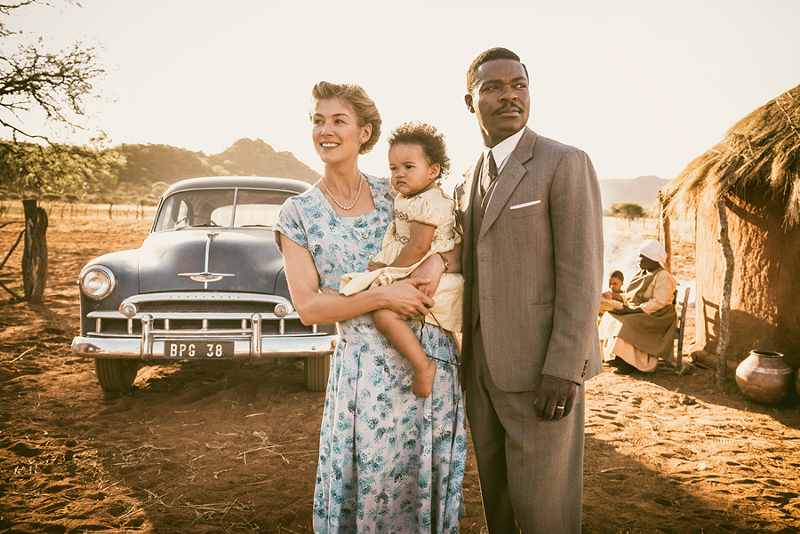Khama, a member of the royal family of Bechuanaland (a British Protectorate in Africa that became the nation of Botswana in 1966) met and fell in love with Williams in the late 1940s while studying in the United Kingdom. They married, against the wishes of leaders in both England and Africa, and Khama then returned home to lead his people down the arduous path to independence.
The Lovings, by contrast, faced discrimination a decade later in Virginia, where they pled guilty to “cohabitating as man and wife, against the peace and dignity of the Commonwealth.”
These couples now share one important thing. Their stories have both become featured in movies, thanks to the efforts of directors Amma Asante (the new A United Kingdom) and Jeff Nichols (last year’s Loving). Both films dramatize the impacts their intimate relationships had on the political, cultural and social landscape and their times.
In A United Kingdom, Asante (the British director of Belle) draws audiences into what appears to be a slightly askew parallel universe. For American viewers fully aware of our own race relations at the time (especially attitudes toward interracial couples), the early scenes featuring Khama (David Oyelowo) boxing against a white opponent, waxing poetically about politics at a party and then wooing Williams (Rosamund Pike) on the dance floor might seem a bit jarring. Khama has the obvious bearings of a man unencumbered by the conventional trappings of race. No doubt, he appreciates racial divisions as an intellectual concept. But he glides by such notions with an air of entitlement, leaving Williams to serve as the more typical figure constrained by the social order.
Soon after they lock eyes across the room and begin their first steps toward their official courtship, Williams faces questions and concerns, starting with her own family. Of course, the real battle begins in the streets of her neighborhood as she and Khama confront bigoted “lads” who denounce her and physically assault him. And the situation becomes trickier when Khama brings her to his homeland in Africa. She, as a white woman, steps into the role of a royal leader for people whose initial reception is cool.
What occurs in both A United Kingdom and Loving is a subtle examination of what happens when white people stumble into a state of black consciousness. As a British white woman, Pike’s Williams has elevated status alongside Khama during their social exchanges with the British government, but that advantage flips when she’s among Khama’s people. She makes the necessary adjustments alone (while pregnant) when Khama seeks to lobby for independence in England. (He is exiled from Bechuanaland at one point.)
It is during this period in the story that Asante’s film aligns with Nichols’ in its portrayal of the women as the quiet powers behind the scenes. Loving illustrates how Richard Loving’s initial urge to fight for his and his wife’s legal rights led to an awakening in Mildred that fueled the marathon-long push for justice. And like Mildred, Ruth Williams displays strength and moral fortitude to carry on the fight when her husband’s will starts to sag. She plants herself among the women in Bechuanaland.
The scale and the stakes are greater in A United Kingdom than in Loving — the fate of a new nation rests on the outcome of Khama’s negotiations with England, which is attempting to placate the apartheid forces in nearby South Africa by resisting him. But director Asante, like Nichols, grounds things in the realm of the personal.
And she goes further by showing how the love between Khama and Williams fortifies and defines their sense of character when they are apart. Ironically, the unity of this couple seems strongest when they are stranded from one another, forced to stand alone, with their heavy heads and hearts held high. (Opens Friday at the Mariemont Theatre) (PG-13) Grade: A-






